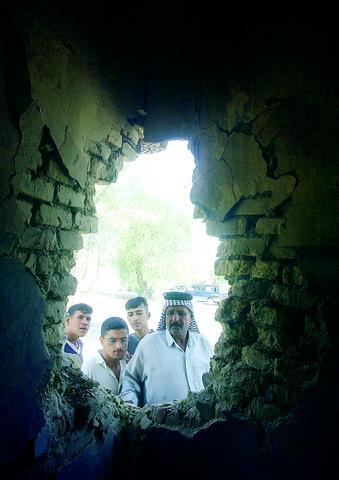Sporadic gunfire, explosions and a US bombing raid shook the city of Najaf yesterday as militants retained control of a revered shrine, raising fears that a plan to end the crisis could collapse amid bickering between Shiite leaders.
Early yesterday, US warplanes bombed Najaf's Old City, the scene of much of the more than two weeks of fighting, and the sounds of shelling could be heard in the streets, witnesses said. The US military could not confirm the bombing, but said operations in Najaf were ongoing.

PHOTO: EPA
US forces also appeared yesterday to have sealed off the Old City, restoring a cordon that had been loosened in recent days.
Three mortar shells exploded near a police station that had been the frequent target of attacks by militants loyal to firebrand Shiite cleric Moqtada al-Sadr. No one was injured, witnesses said.
Fighting in the nearby city of Kufa on Saturday killed 40 of the militants, according to a source in the Interior Ministry. However, Mahmoud al-Soudani, head of al-Sadr's office in west Baghdad, called the claim "government propaganda" and said only one militant had died in Kufa Saturday.
The two sides clashed sporadically in Najaf throughout yesterday morning. At least three people were killed and 18 injured during the fighting overnight, said Tawfiq Mohammed of Najaf General Hospital.
An unofficial mediator and distant relative of the militant leader pleaded with al-Sadr to disarm his militants, pull them out of the shrine and disband his militia immediately.
"We are in a race with time," Hussein al-Sadr said late Saturday.
In separate violence north of Baghdad yesterday, a car bomb exploded in the town of Khalis, killing two people and injuring 14 others, including a deputy provincial governor, Bassam al-Khadran, who was lightly wounded, Iraqi officials said.
A suicide bomber detonated the car, laden with explosives, as al-Khadran was traveling to work in a small convoy, said General Waleed al-Azawi, chief of police for Diyala province. Both fatalities and seven of the injured were al-Khadran's bodyguards, he said. One civilian was also wounded.

INVESTIGATION: The case is the latest instance of a DPP figure being implicated in an espionage network accused of allegedly leaking information to Chinese intelligence Democratic Progressive Party (DPP) member Ho Jen-chieh (何仁傑) was detained and held incommunicado yesterday on suspicion of spying for China during his tenure as assistant to then-minister of foreign affairs Joseph Wu (吳釗燮). The Taipei District Prosecutors’ Office said Ho was implicated during its investigation into alleged spying activities by former Presidential Office consultant Wu Shang-yu (吳尚雨). Prosecutors said there is reason to believe Ho breached the National Security Act (國家安全法) by leaking classified Ministry of Foreign Affairs information to Chinese intelligence. Following interrogation, prosecutors petitioned the Taipei District Court to detain Ho, citing concerns over potential collusion or tampering of evidence. The

‘FORM OF PROTEST’: The German Institute Taipei said it was ‘shocked’ to see Nazi symbolism used in connection with political aims as it condemned the incident Sung Chien-liang (宋建樑), who led efforts to recall Democratic Progressive Party (DPP) Legislator Lee Kun-cheng (李坤城), was released on bail of NT$80,000 yesterday amid an outcry over a Nazi armband he wore to questioning the night before. Sung arrived at the New Taipei City District Prosecutors’ Office for questioning in a recall petition forgery case on Tuesday night wearing a red armband bearing a swastika, carrying a copy of Adolf Hitler’s Mein Kampf and giving a Nazi salute. Sung left the building at 1:15am without the armband and apparently covering the book with a coat. This is a serious international scandal and Chinese

Seventy percent of middle and elementary schools now conduct English classes entirely in English, the Ministry of Education said, as it encourages schools nationwide to adopt this practice Minister of Education (MOE) Cheng Ying-yao (鄭英耀) is scheduled to present a report on the government’s bilingual education policy to the Legislative Yuan’s Education and Culture Committee today. The report would outline strategies aimed at expanding access to education, reducing regional disparities and improving talent cultivation. Implementation of bilingual education policies has varied across local governments, occasionally drawing public criticism. For example, some schools have required teachers of non-English subjects to pass English proficiency

TRADE: The premier pledged safeguards on ‘Made in Taiwan’ labeling, anti-dumping measures and stricter export controls to strengthen its position in trade talks Products labeled “made in Taiwan” must be genuinely made in Taiwan, Premier Cho Jung-tai (卓榮泰) said yesterday, vowing to enforce strict safeguards against “origin laundering” and initiate anti-dumping investigations to prevent China dumping its products in Taiwan. Cho made the remarks in a discussion session with representatives from industries in Kaohsiung. In response to the US government’s recent announcement of “reciprocal” tariffs on its trading partners, President William Lai (賴清德) and Cho last week began a series of consultations with industry leaders nationwide to gather feedback and address concerns. Taiwanese and US officials held a videoconference on Friday evening to discuss the